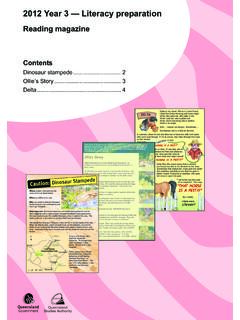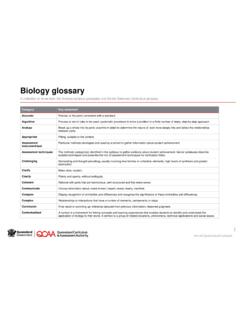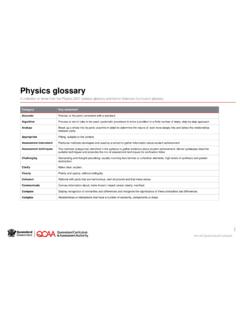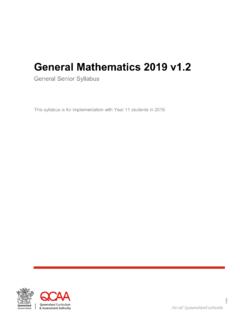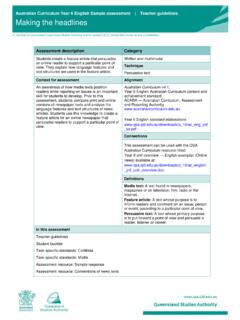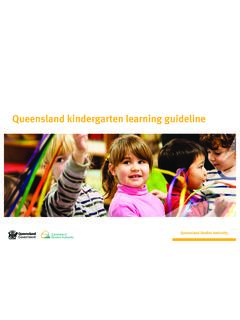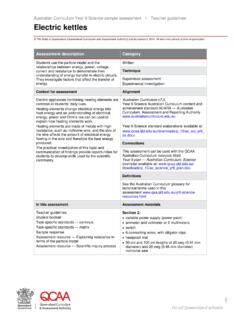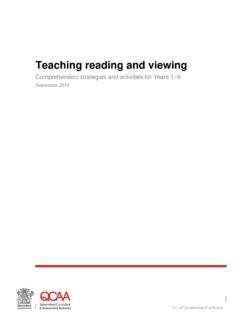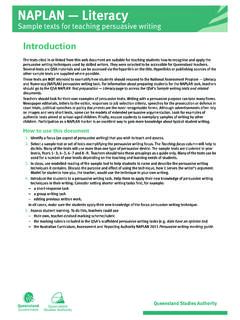Transcription of Biology 2019 v1 - qcaa.qld.edu.au
1 Biology 2019 General Senior syllabus This syllabus is for implementation with Year 11 students in 2019. 180576. Contents 1 Course overview _____ 1. 1. Rationale .. 1. Learning area 3. Course structure .. 4. Teaching and learning .. 5. syllabus objectives .. 5. Underpinning 6. Aboriginal perspectives and Torres Strait Islander perspectives .. 10. Pedagogical and conceptual 10. Subject matter .. 14. Assessment general information .. 16. Formative assessments Units 1 and 16. Summative assessments Units 3 and 16. Reporting standards.
2 18. 2 Unit 1: Cells and multicellular organisms _____ 20. Unit description .. 20. Unit objectives .. 20. Topic 1: Cells as the basis of life .. 21. Topic 2: Multicellular organisms .. 24. Assessment guidance .. 27. 3 Unit 2: Maintaining the internal environment _____ 28. Unit description .. 28. Unit objectives .. 28. Topic 1: Homeostasis .. 29. Topic 2: Infectious disease .. 31. Assessment guidance .. 34. 4 Unit 3: Biodiversity and the interconnectedness of life _ 35. Unit description .. 35. Unit objectives .. 36. Topic 1: Describing biodiversity.
3 37. Topic 2: Ecosystem dynamics .. 39. Assessment .. 42. Summative internal assessment 1 (IA1): Data test (10%) .. 42. Summative internal assessment 2 (IA2): Student experiment (20%) .. 46. Summative external assessment (EA): Examination (50%) .. 52. 5 Unit 4: Heredity and continuity of life _____ 53. Unit description .. 53. Unit objectives .. 53. Topic 1: DNA, genes and the continuity of life .. 54. Topic 2: Continuity of life on Earth .. 58. Assessment .. 60. Summative internal assessment 3 (IA3): Research investigation (20%).
4 60. Summative external assessment (EA): Examination (50%) .. 66. 6 Glossary _____ 68. 7 References _____ 90. 8 Version history _____ 92. 1 Course overview Introduction Rationale At the core of all science endeavour is the inquiry into the nature of the universe. Science uses a systematic way of thinking, involving creative and critical reasoning, in order to acquire better and more reliable knowledge. Scientists recognise that knowledge is not fixed, but is fallible and open to challenge. As such, scientific endeavour is never conducted in isolation, but builds on and challenges an existing body of knowledge in the pursuit of more reliable knowledge.
5 This collaborative process, whereby new knowledge is gained, is essential to the cooperative advancement of science, technology, health and society in the 21st century. Tertiary study in any field will be aided by the transferable skills developed in this senior Science subject. It is expected that an appreciation of, and respect for, evidence-based conclusions and the processes required to gather, scrutinise and use evidence, will be carried forward into all aspects of life beyond the classroom. The purpose of senior Science subjects in Queensland is to introduce students to a scientific discipline.
6 Students will be required to learn and apply aspects of the knowledge and skill of the discipline (thinking, experimentation, problem-solving and research skills), understand how it works and how it may impact society. Upon completion of the course, students will have an appreciation for a body of scientific knowledge and the process that is undertaken to acquire this knowledge. They will be able to distinguish between claims and evidence, opinion and fact, and conjecture and conclusions. In each of the senior Science subjects, students will develop.
7 A deep understanding of a core body of discipline knowledge aspects of the skills used by scientists to develop new knowledge, as well as the opportunity to refine these skills through practical activities the ability to coordinate their understandings of the knowledge and skills associated with the discipline to refine experiments, verify known scientific relationships, explain phenomena with justification and evaluate claims by finding evidence to support or refute the claims. Biology provides opportunities for students to engage with living systems.
8 In Unit 1, students develop their understanding of cells and multicellular organisms. In Unit 2, they engage with the concept of maintaining the internal environment. In Unit 3, students study biodiversity and the interconnectedness of life. This knowledge is linked in Unit 4 with the concepts of heredity and the continuity of life. Students will learn valuable skills required for the scientific investigation of questions. In addition, they will become citizens who are better informed about the world around them and who have the critical skills to evaluate and make evidence-based decisions about current scientific issues.
9 Biology 2019 Queensland Curriculum & Assessment Authority General Senior syllabus June 2018. Page 1 of 92. Biology aims to develop students': sense of wonder and curiosity about life respect for all living things and the environment understanding of how biological systems interact and are interrelated, the flow of matter and energy through and between these systems, and the processes by which they persist and change understanding of major biological concepts, theories and models related to biological systems at all scales, from subcellular processes to ecosystem dynamics appreciation of how biological knowledge has developed over time and continues to develop.
10 How scientists use Biology in a wide range of applications; and how biological knowledge influences society in local, regional and global contexts ability to plan and carry out fieldwork, laboratory and other research investigations, including the collection and analysis of qualitative and quantitative data and the interpretation of evidence ability to use sound, evidence-based arguments creatively and analytically when evaluating claims and applying biological knowledge ability to communicate biological understanding, findings.
